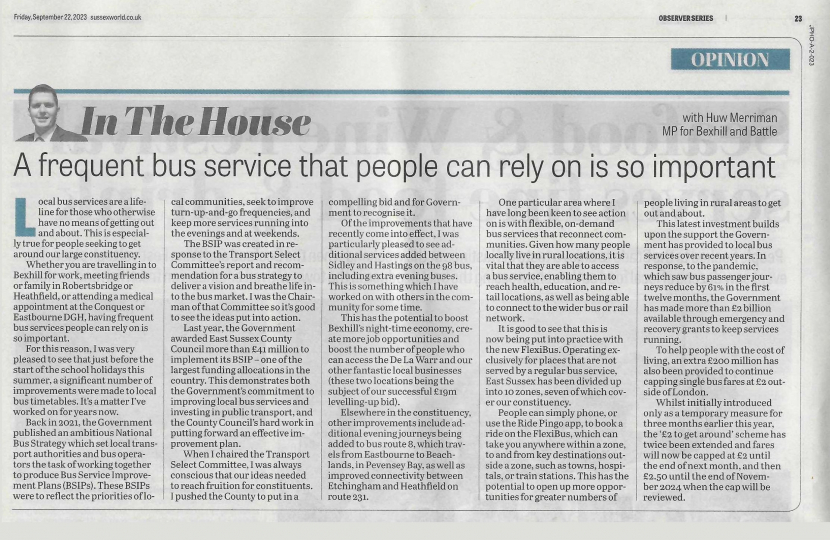
Local bus services are a lifeline for those who otherwise have no means of getting out and about. This is especially true for people seeking to get around our large constituency. Whether you are travelling in to Bexhill for work, meeting friends or family in Robertsbridge or Heathfield, or attending a medical appointment at the Conquest or Eastbourne DGH, having frequent bus services people can rely on is so important.
For this reason, I was very pleased to see that just before the start of the school holidays this summer, a significant number of improvements were made to local bus timetables. It’s a matter I’ve worked on for years now.
Back in 2021, the Government published an ambitious National Bus Strategy which set local transport authorities and bus operators the task of working together to produce Bus Service Improvement Plans (BSIPs). These BSIPs were to reflect the priorities of local communities, seek to improve turn-up-and-go frequencies, and keep more services running into the evenings and at weekends. The BSIP was created in response to the Transport Select Committee’s report and recommendation for a bus strategy to deliver a vision and breathe life into the bus market. I was the Chairman of that Committee so it’s good to see the ideas put into action.
Last year, the Government awarded East Sussex County Council more than £41 million to implement its BSIP – one of the largest funding allocations in the country. This demonstrates both the Government’s commitment to improving local bus services and investing in public transport, and the County Council’s hard work in putting forward an effective improvement plan. When I chaired the Transport Select Committee, I was always conscious that our ideas needed to reach fruition for constituents. I pushed the County to put in a compelling bid and for Government to recognise it.
Of the improvements that have recently come into effect, I was particularly pleased to see additional services added between Sidley and Hastings on the 98 bus, including extra evening buses. This is something which I have worked on with others in the community for some time. This has the potential to boost Bexhill’s night-time economy, create more job opportunities and boost the number of people who can access the De La Warr and our other fantastic local businesses (these two locations being the subject of our successful £19m levelling-up bid).
Elsewhere in the constituency, other improvements include additional evening journeys being added to bus route 8, which travels from Eastbourne to Beachlands, in Pevensey Bay, as well as improved connectivity between Etchingham and Heathfield on route 231.
One particular area where I have long been keen to see action on is with flexible, on-demand bus services that reconnect communities. Given how many people locally live in rural locations, it is vital that they are able to access a bus service, enabling them to reach health, education, and retail locations, as well as being able to connect to the wider bus or rail network.
It is good to see that this is now being put into practice with the new FlexiBus. Operating exclusively for places that are not served by a regular bus service, East Sussex has been divided up into 10 zones, seven of which cover our constituency. People can simply phone, or use the Ride Pingo app, to book a ride on the FlexiBus, which can take you anywhere within a zone, to and from key destinations outside a zone, such as towns, hospitals, or train stations. This has the potential to open up more opportunities for greater numbers of people living in rural areas to get out and about.
This latest investment builds upon the support the Government has provided to local bus services over recent years. In response, to the pandemic, which saw bus passenger journeys reduce by 61% in the first twelve months, the Government has made more than £2 billion available through emergency and recovery grants to keep services running.
To help people with the cost of living, an extra £200 million has also been provided to continue capping single bus fares at £2 outside of London. Whilst initially introduced only as a temporary measure for three months earlier this year, the ‘£2 to get around’ scheme has twice been extended and fares will now be capped at £2 until the end of next month, and then £2.50 until the end of November 2024 when the cap will be reviewed.
I hope these new services get used so they continue to serve our communities into the future.



